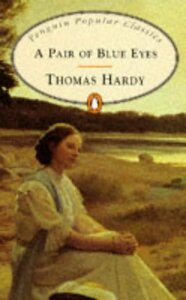You need to sign in or sign up before continuing.
Take a photo of a barcode or cover
lighthearted
fast-paced
Plot or Character Driven:
A mix
Strong character development:
No
Loveable characters:
No
Diverse cast of characters:
No
Flaws of characters a main focus:
Complicated
Not an impressive tale—a bit thin, lax but certainly well-balanced and crafted. It felt like a romance entirely carried by its plot-points than anything compelling in the characters or setting. Still, enjoyable and you can see elements and themes that will show up in Hardy’s more mature novels
Somewhat of a peculiarity in the Hardy canon, set as it is on the North Cornish Coast, and not the Wessex heartland of most of Hardy's later work, this is an engaging read, albeit with signs that Hardy is not yet fully developed. Many elements of the plot echo that developed later, and in an ultimately more satisfying novel in Tess. Writing for serial form, Hardy pulls tricks out of the bag to keep the serial reader engaged, not least of all the original "cliff hanger" scene, when a character is left, literally hanging off a cliff between chapters. Alongside these, Hardy employs some neat mirror imagery in scene setting between events describing Elfride's relations with both her suitors. But it's hard to shake a sense that the book's conclusion is hurried, with a weak plot denouement, again, an similar plot outcome handled so much better in Tess. At the same time, it is a dialogue heavy novel, not necessarily featuring Dorset dialogue Hardy was also known for (and had worked so well for him in the previous Greenwood Tree) and at times it felt like wading through mid-Victorian RP treacle! There are however some lovely spots of landscape writing, with Hardy using the dramatic North Devon Coast's potential well. There is literary debate over the degree of involvement of Hardy's wife to be Emma Gifford in contributing to, or just proofing this novel. It seems to me that there are elements of the writing (esp in the dialogue) that feel distinctly un-Hardean, so perhaps Emma's involvement was significant, or alternatively Hardy is still writing as an author who has not yet found his distinctive voice. Whatever the case, it seems very odd to me that Emma was involved, to a greater or lesser extent, in a novel which it is well accepted the central character is based on Emma herself (and indeed elements of Steven her first suitor on Hardy and the story of their meeting and falling in love) when the novel is so harsh to the character of Elfride overall. It is far from a love letter to Emma from Hardy! So, a distracting enough read but too dialogue heavy (I am eager to get to the Hardy who writes of landscape so well, capturing place almost as a central character in his books) and unfinished enough as a writer to be fully developed as a great novel. Very much looking forward to starting the great era now with Far From The Madding Crowd next.
hardy's softest and best portrayal of human nature and the relationship between man and woman.
Wearing over all...bit annoying ,some good passages,but why did Hardy have to kill her,after all that she could have been allowed to enjoy her marriage....
I think I could’ve forgiven this book a lot of it’s flaws if it had given Elfride a happier ending. It was a bit frustrating how the author would make her clever or smart by writing her own novel or being a proficient chess player. And then completely obliterate any sense of self by making her subservient to Mr. Knight at every opportunity. I wanted so much more for her. The ending felt bizarrely farcical with Stephen and Mr. Knight racing to Endelstowe and then the immediate tone shift when they realize that they are on the same train as Elfride’s corpse returning from London. It would’ve been nice to at least be shown some of Elfride’s happiness. Her entire existence seemed to be plagued by worry and concealing secrets that. Not exactly a pleasant read and doesn’t really grip the reader to make the depressing plot line worth the journey.
medium-paced
Plot or Character Driven:
A mix
Strong character development:
Yes
Diverse cast of characters:
No
Flaws of characters a main focus:
Yes
medium-paced
Loveable characters:
No
Flaws of characters a main focus:
Yes
Angsty teen romance with mild misogynistic undertones. Has the usual Victorian female lead ending iykyk, that makes it kind of anticlimactic. I just wish there was more drama and actual jealousy instead of mellow back and forth and ONE conversation (not even a fight???) over Elfride
Overall, hardly Hardy's best work (pun intended)
4.5/10
Overall, hardly Hardy's best work (pun intended)
4.5/10
Hardy uses a love triangle to say a lot of things about love, class, women, and life, but whether it's the culture and time differences between us or a flaw in the work itself, I feel like I missed a lot of what he was saying. I suspect I often took as sincere things meant to be ironic, and perhaps took as ironic things meant to be sincere, but the tone seemed to waver between comedic and tragic unpredictably. Evocative but frustrating. Probably worth the read, however, for a deservedly famous dramatic rescue on a cliff. I expected that rescue to lead to the discovery of a greater depth of character for the heroine (a rather weak-willed girl who suddenly acts with determination and bravery), but it never seemed to pay off in the long run. It stands on its own beautifully, though.
This was so, so good. As with all of Hardy’s novels (that I’ve read), the story begins somewhat slowly and conventionally, only to suddenly take off and become super engrossing.
Additionally, I love the way in which all his female heroines appear traditional but are secretly subverting or at least challenging the status quo.
That whole scene with Elfride and Knight on the cliffs? Brilliant.
Hardy never disappoints, even 150 years later.
Additionally, I love the way in which all his female heroines appear traditional but are secretly subverting or at least challenging the status quo.
That whole scene with Elfride and Knight on the cliffs? Brilliant.
Hardy never disappoints, even 150 years later.




